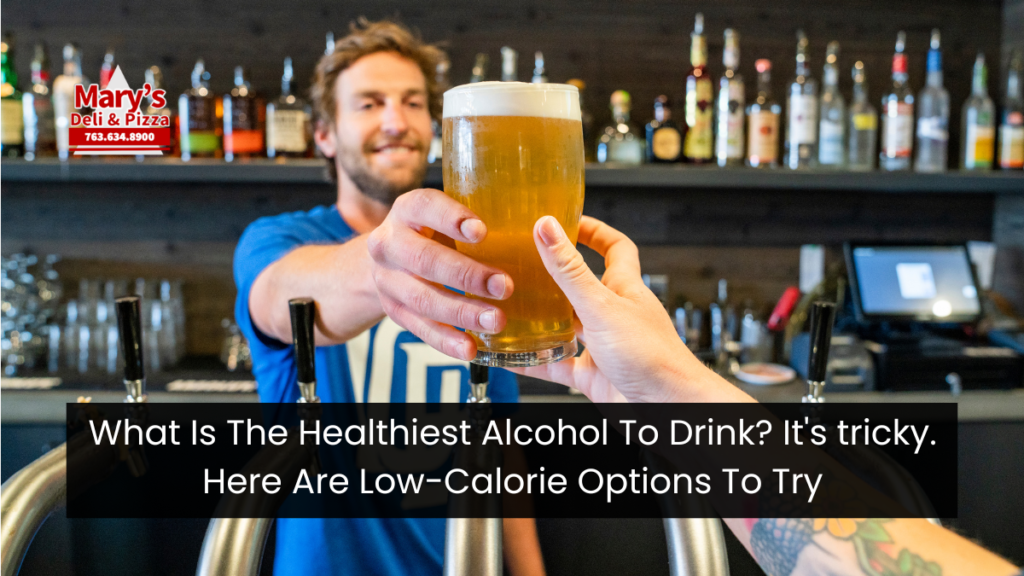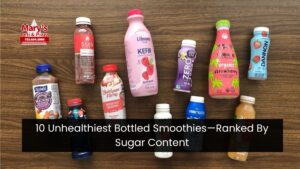As the holiday season approaches, many people look forward to relaxing with a cocktail, beer, or glass of wine in hand. With the rise of ready-to-drink cocktails and an ever-growing variety of alcoholic beverages, it’s no surprise that people want to indulge while staying mindful of their health. But, when it comes to picking the healthiest alcohol options, the choice can be tricky.
In this guide, we’ll explore which alcoholic beverages are lower in calories, how to make healthier drink choices, and what you should know about the nutritional impact of alcohol. Whether you’re a fan of vodka, tequila, or wine, here’s everything you need to know about staying healthy while enjoying your favorite drinks.
What Is The Healthiest Alcohol?
When it comes to low-calorie alcohol options, clear liquors are generally the best choice. According to nutrition experts, spirits like vodka, gin, rum, tequila, and soju contain fewer calories and sugar compared to their darker counterparts.
These clear liquors are relatively simple and won’t add unnecessary sugar to your drink, which can help if you’re aiming for a more health-conscious cocktail.
However, it’s essential to remember that all alcohol contains calories and offers minimal to no nutritional value. As Registered Dietitian Alex Aldeborgh notes, moderation is the most critical factor when it comes to alcohol consumption. Rather than focusing solely on the type of alcohol, paying attention to how much you drink will have a more significant impact on your overall health.
Moderation Is Key
The Dietary Guidelines for Americans recommend that men should have no more than two drinks per day, while women should limit themselves to one drink per day. Drinking beyond these limits can increase your risk of developing health problems like heart disease, liver disease, and certain types of cancer.
Excessive alcohol consumption can also contribute to weight gain due to its high-calorie content and the tendency to pair it with unhealthy foods.
Red Wine And Antioxidants: Are The Health Claims True?
Many people have heard that red wine is good for your health, thanks to its antioxidant content. Specifically, red wine contains resveratrol, a compound found in the skin of grapes, which is known for its anti-inflammatory and disease-preventing properties.
While red wine does offer some health benefits, it’s important not to overestimate its impact. You would have to drink large quantities of red wine to get a significant amount of resveratrol, which would, unfortunately, outweigh the potential benefits. The key takeaway here is that you’re better off getting your antioxidants from fruits, vegetables, and other whole foods rather than relying on red wine.
If you’re looking to boost your resveratrol intake, try incorporating foods like peanuts, pistachios, blueberries, grapes, and even dark chocolate into your diet. These will offer similar health benefits without the risks associated with alcohol consumption.
Healthiest Alcoholic Drinks To Try
For those who love the occasional cocktail but want to make healthier choices, it’s all about finding the right balance between flavor and simplicity. Many popular cocktails contain added sugars in the form of syrups, mixers, and sweetened juices, which can quickly turn your drink into a calorie bomb.
Here are a few tips for making your cocktail a bit healthier:
- Stick to basic ingredients: When ordering or making a drink, choose simple ingredients like fresh citrus juice, soda water, or tonic. Skip the sugary mixers in favor of natural flavors like lime or lemon.
- Try vodka soda: A classic vodka soda is one of the lowest-calorie drinks you can have. For a touch of sweetness, add a splash of cranberry or grapefruit juice.
- Opt for a rum and Diet Coke: If you’re a fan of the classic rum and Coke, consider switching to Diet Coke to cut back on sugar. You’ll still get the flavor of the drink without the extra calories.
- Avoid sugary cocktails: Drinks like margaritas, daiquiris, and other frozen cocktails are often loaded with sugar and can lead to a sugar crash or hangover the next day. Keep it simple and light to avoid feeling sluggish.
Remember, sugary drinks tend to mask the alcohol taste, which can lead to overconsumption without realizing it. If you find yourself drinking more because the cocktail tastes sweet, consider switching to a less sweet alternative.
Alcohol And Your Health: The Risks
While alcohol is often seen as a part of social and cultural life, it’s essential to understand that it is a toxic substance when consumed in large amounts. Even in small amounts, alcohol can harm the body by increasing the risk of liver disease, heart problems, and alcohol addiction. It also offers no significant nutritional value—meaning, if you’re drinking alcohol, you’re essentially consuming empty calories.
On a gram-per-gram basis, alcohol is highly caloric, containing about 7 calories per gram. This is nearly double the calorie content of carbohydrates and protein. However, alcohol doesn’t provide the same benefits as macronutrients, making it easy to consume extra calories without feeling full or satisfied.
Tips For Drinking Alcohol In A Healthy Way
If you enjoy drinking alcohol occasionally, there are ways to make it fit into a balanced diet. Here are a few tips to help you enjoy your drink without overindulging:
- Eat before you drink: Drinking on an empty stomach can cause your blood alcohol level to spike quickly, making you feel the effects faster. Having a meal or snacks before drinking can slow down alcohol absorption and help you avoid getting too tipsy too quickly.
- Stay hydrated: Alcohol is a diuretic, meaning it causes your body to lose fluids. To prevent dehydration, try alternating between an alcoholic beverage and a glass of water throughout the night. This can also help reduce the severity of hangovers.
- Set healthy boundaries: Avoid using alcohol as a coping mechanism for stress, and be mindful of drinking under pressure from others. Establish clear boundaries for yourself, and stick to them.
- Drink mindfully: Take the time to savor your drink, and avoid rushing through it. This not only helps with moderation, but it also allows you to enjoy the experience fully.
- Know your limits: The effects of alcohol can vary depending on factors like body weight, metabolism, and tolerance. Be aware of how much you can handle and never push past your limits.
Conclusion:
While alcohol may be part of our social culture, it’s crucial to approach it with moderation and mindfulness. Clear liquors like vodka, gin, and tequila are some of the lowest-calorie options, but the most important factor is how much you drink. Red wine may offer some antioxidant benefits, but it’s no substitute for a healthy diet rich in fruits, vegetables, and whole foods.
Remember, the key to staying healthy while enjoying alcohol is moderation, hydration, and making smart choices about what you drink. And if you don’t already drink, there’s no health reason to start.
FAQs
1. What Is The Healthiest Alcohol To Drink?
Clear liquors like vodka, gin, and tequila are considered some of the healthiest options due to their low calorie and sugar content.
2. Is Red Wine Good For Your Health?
While red wine contains antioxidants like resveratrol, you would need to drink large amounts to see significant benefits. It’s better to get these compounds from foods like grapes and berries.
3. Can I Drink Alcohol And Still Lose Weight?
Yes, but it’s essential to drink in moderation and choose low-calorie options like vodka soda or wine. Avoid sugary mixers and cocktails to keep calories in check.
4. How Can I Prevent A Hangover?
To reduce the chances of a hangover, stay hydrated by alternating between alcoholic drinks and water. Also, avoid drinking on an empty stomach.
5. Should I Avoid Alcohol Altogether For Health Reasons?
If you don’t already drink, there’s no health reason to start. Alcohol can fit into a healthy lifestyle when consumed in moderation, but it provides no significant nutritional benefits.






